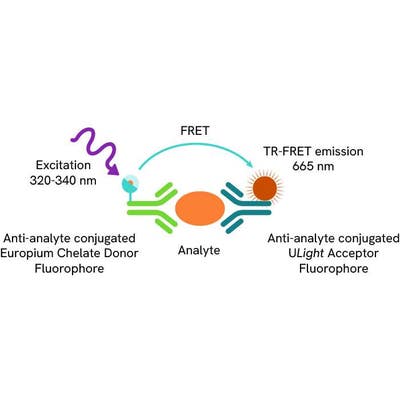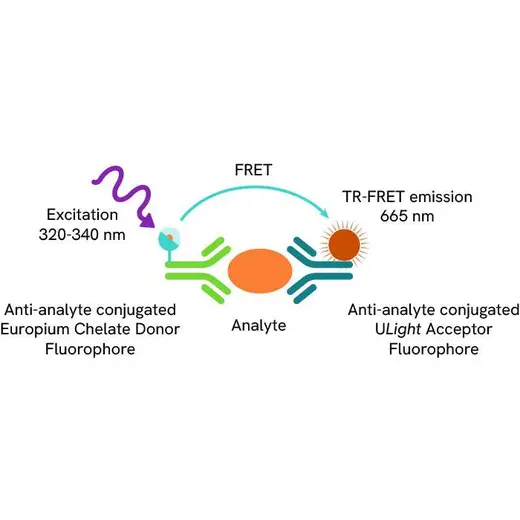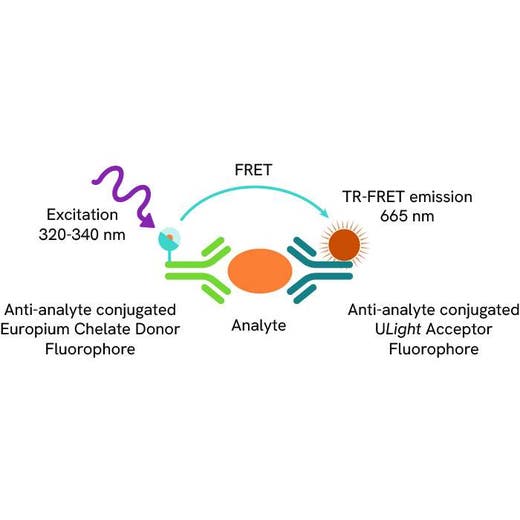
LANCE Ultra Human IL-1b Detection Kit, 10,000 Assay Points

LANCE Ultra Human IL-1b Detection Kit, 10,000 Assay Points




The LANCE® Ultra Human IL-1β Detection Kit is designed for detection and quantitation of human interleuukin-1β in cell culture media using a homogeneous TR-FRET (no-wash steps, no separation steps) assay.
For research use only. Not for use in diagnostic procedures. All products to be used in accordance with applicable laws and regulations including without limitation, consumption and disposal requirements under European REACH regulations (EC 1907/2006).
| Feature | Specification |
|---|---|
| Application | Protein Quantification |
| Dynamic Range | 21.1- 30,000 pg/mL |
| Limit of Detection | 21.1 pg/mL |
| Limit of Quantification | 68.6 pg/mL |
| Sample Volume | 15 µL |
The LANCE® Ultra Human IL-1β Detection Kit is designed for detection and quantitation of human interleuukin-1β in cell culture media using a homogeneous TR-FRET (no-wash steps, no separation steps) assay.
For research use only. Not for use in diagnostic procedures. All products to be used in accordance with applicable laws and regulations including without limitation, consumption and disposal requirements under European REACH regulations (EC 1907/2006).


LANCE Ultra Human IL-1b Detection Kit, 10,000 Assay Points


LANCE Ultra Human IL-1b Detection Kit, 10,000 Assay Points


Product information
Overview
The LANCE Ultra Human IL-1β Detection Kit is designed for detection and quantitation of human interleuukin-1β in cell culture media using a homogeneous TR-FRET (no-wash steps, no separation steps) assay.
The 500 point kit contains enough reagents to run 500 wells in 384-well format, using a 20 µL reaction volume (15 µL of sample). The 10,000 point kit contains enough reagents to run 10,000 wells in 384-well format, using a 20 µL reaction volume (15 µL of sample).
- No-wash steps, no separation steps
- TR-FRET technology
- Sensitive detection
- High reproducibility
- Faster time-to-results
- Easy automation
- 96-well, 384-well, and 1536-well formats
LANCE and LANCE (Lanthanide chelate excite) Ultra are our TR-FRET (time-resolved fluorescence resonance energy transfer), homogeneous (no wash) technologies. One antibody of interest is labeled with a donor fluorophore (a LANCE Europium chelate) and the second molecule is labeled with an acceptor fluorophore (ULight™ dye). Upon excitation at 320 or 340 nm, energy can be transferred from the donor Europium chelate to the acceptor fluorophore if sufficiently close for FRET (~10 nm). This results in the emission of light at 665 nm.
IL1α and IL1ß are central players of the immune response, displaying roles in inflammation both at local and systemic levels. Despite they seem to display very similar functions, these proteins are encoded by two independent genes sharing only ~30% identity. IL1ß is synthesized as a 31 kDa precursor that is cleaved by Caspase-1 (ICE) into the active 17 kDa form, and eventually released into the extracellular space. Its production has been reported in many cell types including brain and, importantly, monocytic and periferal blood mononuclear cells. After binding to its receptor, IL-1RI, IL1ß triggers a cascade of kinase signaling pathways that lead to the activation of transcription factors like NFκB and AP-1, eventually activating the expression of genes such as MIP-2 and C-reactive protein.
Specifications
| Application |
Protein Quantification
|
|---|---|
| Automation Compatible |
Yes
|
| Brand |
LANCE Ultra
|
| Detection Modality |
LANCE
|
| Dynamic Range |
21.1- 30,000 pg/mL
|
| Limit of Detection |
21.1 pg/mL
|
| Limit of Quantification |
68.6 pg/mL
|
| Product Group |
Kit
|
| Sample Volume |
15 µL
|
| Shipping Conditions |
Shipped in Blue Ice
|
| Target |
IL1β
|
| Target Class |
Cytokines
|
| Target Species |
Human
|
| Technology |
TR-FRET
|
| Therapeutic Area |
Inflammation
|
| Unit Size |
10,000 Assay Points
|
Resources
Are you looking for resources, click on the resource type to explore further.
Emerging pathways to neuroinflammation and neurodegeneration
Neurodegenerative diseases, such as amyotrophic lateral sclerosis...


How can we help you?
We are here to answer your questions.






























